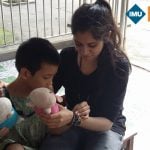Prof Dr Hoh Boon Peng is a molecular and population geneticist, currently affiliated with the Division of Applied Biomedical Science and Biotechnology, School of Health Sciences at the International Medical University. He brings with him a wealth of knowledge and experience into the University’s programmes which he primarily teaches, the Biomedical Science and Medical Biotechnology programmes at the IMU.
Dr Hoh obtained his PhD in Genetics from Universiti Putra Malaysia. He began his career in the School of Medical Sciences, Universiti Sains Malaysia, Kubang Kerian, and subsequently the Faculty of Medicine, Universiti Teknologi MARA. He then joined the UCSI University in 2015 as a Professor in Human Genetics.
Inspired by his supervisor and mentor, Prof Tan Soon Guan, Dr Hoh has ventured into the research on human population and evolutionary genetics. In general, his research addresses the long-standing fundamental question of “Why do I look different from you?”. Specifically, he utilises the information from human genomic variation and infers the modern human migration and peopling history out-of-Africa into Southeast Asia region, and how the ancestors of modern human adapted and survived to different environment and climate in different parts of the world, hence expressing different phenotypes, and different susceptibility of diseases – a field of study termed as “Darwinian Medicine”. A classic model to this is the interactions between severe malaria and individuals with haemoglobinopathies (e.g., sickle cell anaemia, G6PD deficiency, Thalassaemia, Duffy coat antigen deficiency).
The sickle cell mutation is relevant to malaria because infection of a red blood cell with the malaria parasite leads to hypoxia. In individuals of the sickle cell genotype such blood cells sickle and are then eliminated by macrophage cells of the body’s immune system, lessening the burden of infection. Addressing such fundamental question is crucial to understanding of disease evolution and aetiologies, which ultimately contribute to materialization of precision medicine approach.
In addition, he is also involved in the studies on gene mapping of several common and complex diseases including infectious diseases, hypertension and cardiovascular diseases. He is current exploring the potentials of utilizing genetic markers to predict individual’s responses against selected lines of anti-hypertensive medication.

During his early career, Dr Hoh has the privilege to attend a short-term workshop in Wellcome Trust Sanger Institute, Hinxton, UK, where he developed his ‘know-how’ in Genome-wide Association Study (GWAS) and genome copy number variation (CNV). Dr Hoh used to be a member of the HUGO Pan-Asian SNP Consortium, one of the largest research consortia in Asia, which revealed the early modern human migration out-of-Africa into Southeast Asia region. This ground-breaking finding had resulted in a seminal publication in Science (2009). His other major findings include: unveiling the genomic structure of the native populations from Malaysia, identifying candidate genes that are susceptible for malaria, dengue, dilated cardiomyopathy, and left ventricular hypertension.

Acknowledging the notion that ‘genotype is meaningless without phenotypes’, Dr Hoh has recently explored a newly emerging field of research namely, phenomics. Phenotype is a way to classify a set of properties that arise from the interaction of an individual genotype and environment. Human phenome refers to the complete set of all human characteristics: from macro- to micro-scales, from external appearance to internal functions, from biochemical characteristics to microbiota and psychological behaviour, from population to individual levels, and from system to tissue and cellular characteristics. Complete catalogue of emergent phenotypes or varying clinical manifestations of disease will be a reference to future biomedical related investigations and precision medicine approaches. Dr Hoh attempts to create a phenomic atlas that catalogue specifically all phenotypic characterizations of populations from Malaysia. He has recently been appointed as the board member for the International Human Phenomics Consortium.
Dr Hoh had received several awards throughout his academic career. In 2011, he was awarded the ASM Dr Ranjeet Bhagwan Singh International Fellowship, which allowed him to do a short-term research attachment in The Centre for Applied Genomics (SickKids Hospital Toronto). Subsequently he was awarded the JCI Ten Outstanding Young Malaysian (Academic Achievement and Accomplishment) in 2013. He also received two international fellowships from China, namely the Fellowship for Visiting Scientists from Developing Countries (2014), and Chinese Academy of Sciences, President’s International Fellowship Initiative (2017), where he was serving as the visiting professor in Shanghai Institute of Biological Sciences for 1 year, and builds a strong research partnership with Chinese Academy of Sciences, and Fudan University. He was also recognized as the best author award (2013) by UiTM.
To date, Dr Hoh has published more than 70 peer-reviewed both local and international journal publications. Currently he is serving as a member of the editorial board for several international journals including: npj Genomic Medicine, PLOS ONE, BMC Medical Genomics, BMC Genomic Data, Molecular Genetics and Genomics, Frontiers in Genetics, Frontiers in Ecology and Evolution, Frontiers in Plant Sciences, Frontiers in Microbiology.









